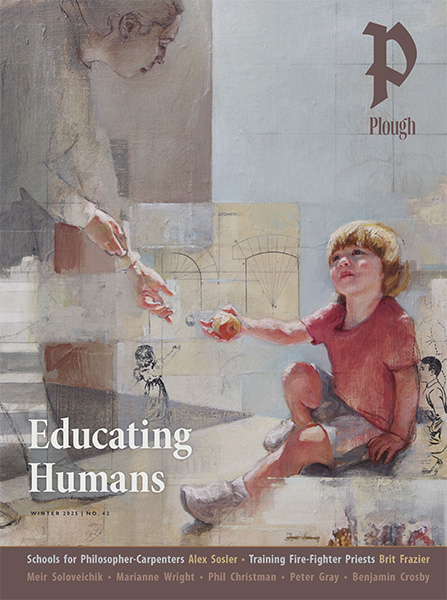Subtotal: $
Checkout
The Danger of Congeniality
Often mischaracterized as a soft chumminess, Christian love is close to the opposite. Indeed, it has the power to overcome enmity and death.
By Friedrich Wilhelm Foerster
April 30, 2023
Nietzsche had a very sharp eye for the dangers of unguarded and disordered social feelings in man; his words: “Community makes common,” are sprung from his observation of these dangers. We seek, like the animal, protection and security from friendship. Compassion, congeniality and the urge for companionship tie us in a thousand ways to our fellow men and give them power over us; the fear of hurting the feelings of others or of setting loose hostile counter-effects prevents the unerring accomplishment of necessary actions. That is why Nietzsche says: “Woe to them who know nothing higher than their compassion.” And to the man who desires to accomplish something he says: “Love not thy neighbor but thy work.” However one-sided Nietzsche may be, he has correctly recognized the danger, a danger which is especially grave at a time when the general collapse of religious goals delivers man to all those stolid instincts.
It is remarkable that in such times the stolid social morale of instinct is imperceptibly penetrating into the religious consciousness of Christian groups and there is leading interpretation of the Gospel astray and causing it to be superficial.
In private life and in national life peace and reconciliation are being sought at any price. The quickest possible production or restoration of the community poses as Christian duty; forgiving and forgetting are granted without the crime being expiated or the injustice revoked; the weak mother cannot bear even passing tensions in her relationship to her fallible child; thus inordinate desire for uninterrupted congeniality becomes a hindrance for all serious education; the desire for congeniality becomes the cause of absolute nullity of character.

Hip, Hip, Hurrah! Artists’ Party, Skagen, 1887–88. Göteborgs konstmuseum/Gothenburg Museum of Art. Photograph by Hossein Sehatlou, Creative Commons.
What a mistake to call this Christian love! In such interpretation of the Gospel divine truth is lacking; that is, the duty of ordering and watching over, of purifying and exalting our human love from the point of view of God, of making it serviceable to the striving for eternal good for us and for those we love. …
Others’ guilt cannot be pardoned quickly enough if it is confessed, repented and expiated before God, but where this has not been done, forgetting it is forgetting God and reconciliation is characterless and a betrayal of one’s own truth. Loyalty in regard to this truth is more important than overhasty restoration of so-called good relations. In reality a human relationship is “good” only when it unites itself with the worship of the highest truth. Saint Augustine said, referring to our relationship to the beloved dead: “One never loses those who have been loved in Thee, O Lord! These words must also be applied to love for the living and to the restoration of temporarily ruptured relations, they are also applicable to broken relations between whole nations.
The essence of Christian love consists in its being first of all love of God and only after that love of neighbor.
Taking guilt too lightly always avenges itself – either on us or on our neighbor, to whom we gave absolution too quickly – because of weakness of character. Whoever takes someone else’s injustice too lightly for the sake of peace and love, will take his own injustice all the more lightly, and only too often such weakness in the face of the errors of others is only the conscious or unconscious preparation for the giving up of all incorruptible demands in regard to one’s own inordinate wishes.
True Christian love is not a restoration of community at any price, not a melting absorption in one’s fellow man, not an unprincipled reconciliation with him who has not reconciled himself with God, no, the essence of Christian love consists in its being first of all love of God and only after that love of neighbor. Human love is soft; Christian love is hard, and therefore it overcomes death, misunderstanding, enmity and ingratitude – and, not least, the greatest peril of love: the uncontrolled, characterless need for congeniality and comradeship, which desires above all and without interruption nothing but community and feels neither for others’ nor for its own eternal salvation any clear and compelling responsibility.
To be sure – in this world such Christian love shares in all the tragedy of the cross of Christ.
Source: Friedrich Wilhelm Foerster, Christ and the Human Life, (New York: Philosophical Library, 1953), 259–260. Used by permission.
Already a subscriber? Sign in
Try 3 months of unlimited access. Start your FREE TRIAL today. Cancel anytime.







Larry A. Smith
Calls for Ukrainian Christians to forgive Russian Christians come to mind.